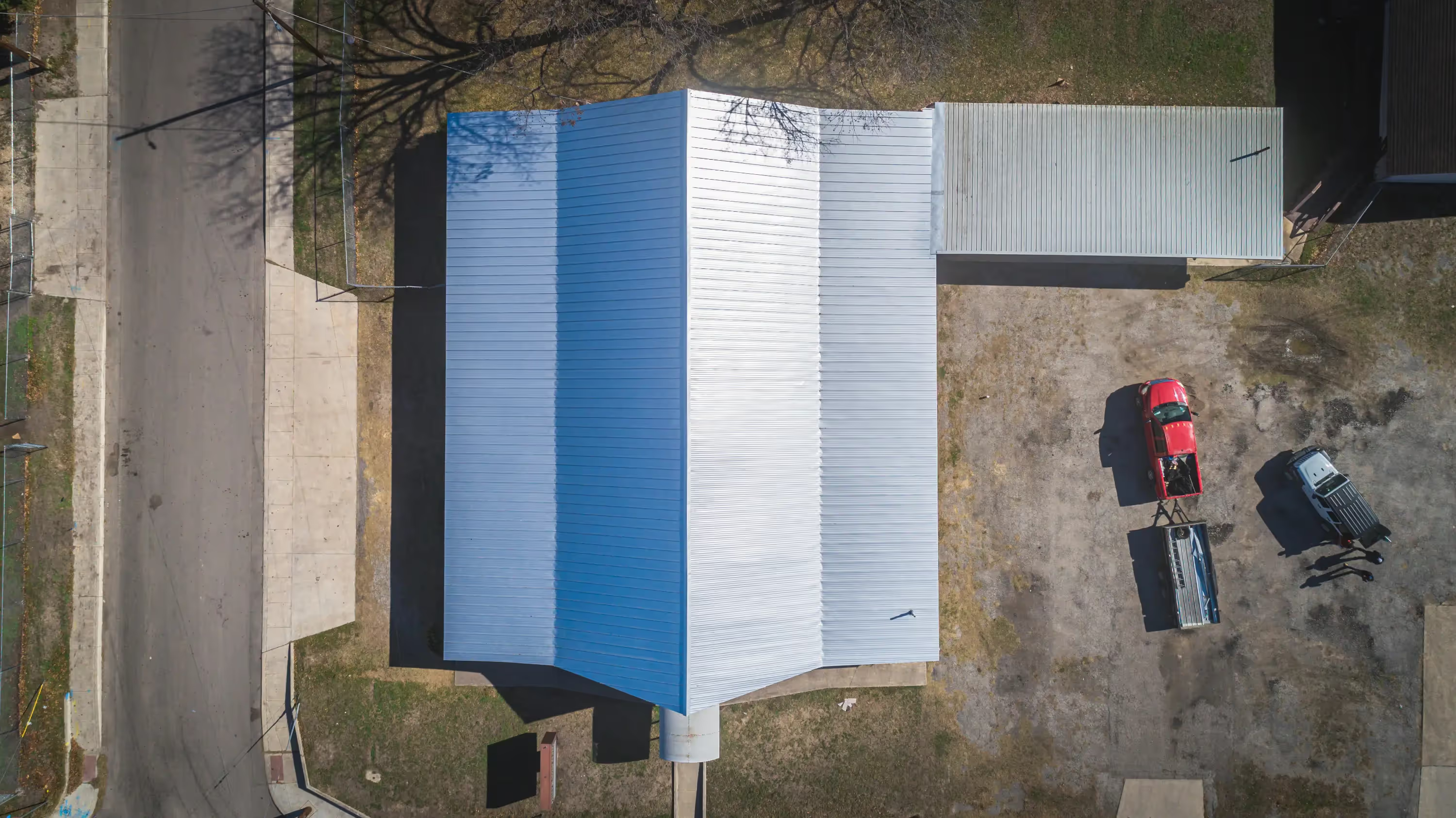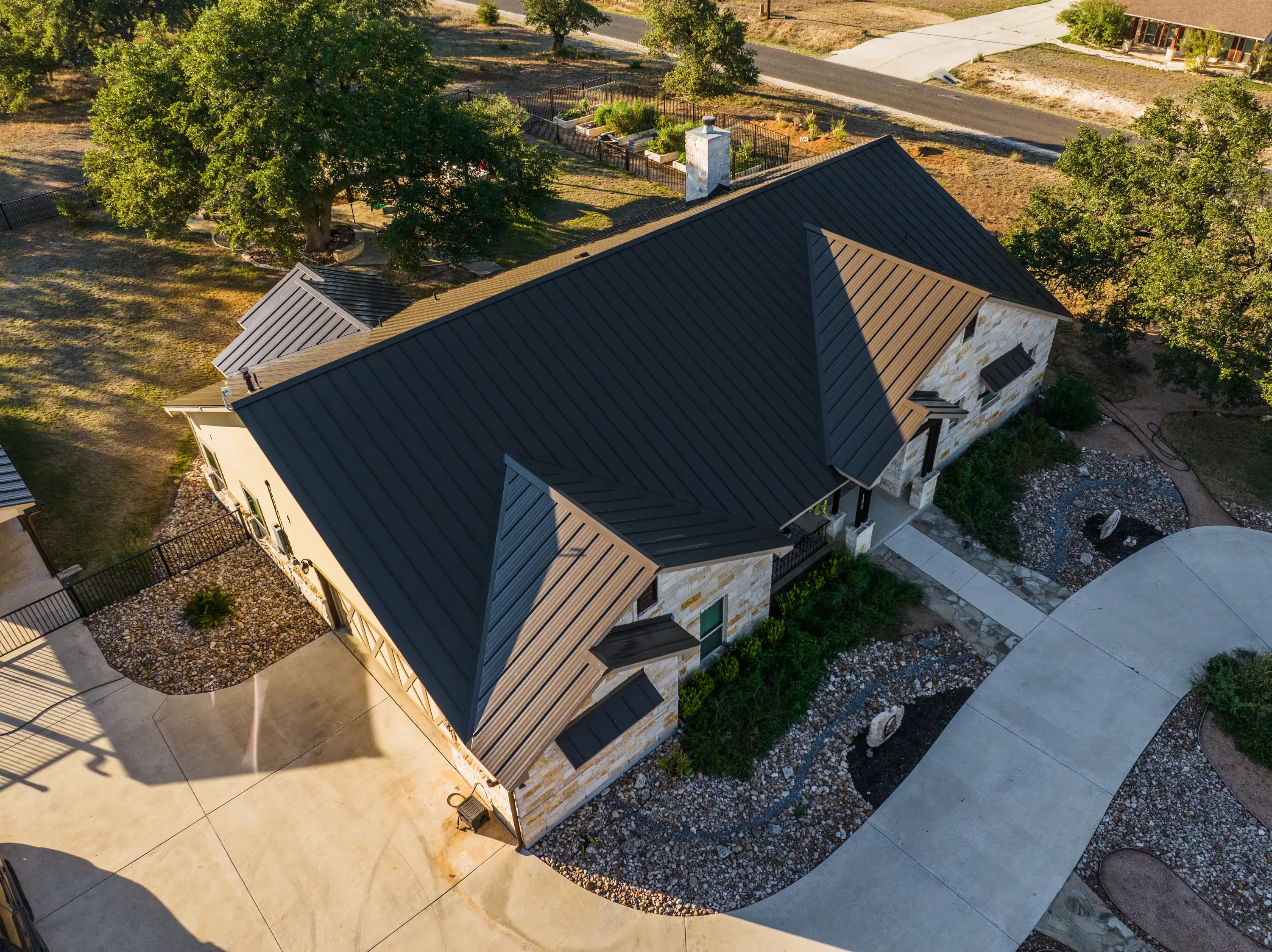Protecting Texas Businesses with Expert Commercial Roofing by ARP Roofing
Are you looking for a commercial roofing solution that protects your business and reduces costs? At ARP Roofing, we specialize in installing and maintaining roofing systems designed for Texas’ extreme weather conditions. Our tailored roofing solutions ensure durability, energy efficiency, and peace of mind, whether it's the scorching sun, heavy rains, or high winds.
Serving San Antonio, Austin, Victoria, and the Texas Gulf Coast, we provide expert roofing for businesses of all sizes. Wondering, “Which commercial roof is best for my business?” or “Where can I find reliable roofing contractors near me?” We’ve got you covered.
Call ARP Roofing now to schedule your FREE consultation and get the roof your business deserves.
{{cta-buttons-group}}
Types of Commercial Roofs We Work With
Single-Ply Roofing Membranes – Lightweight and Durable
Single-ply membranes are among the most popular solutions for flat or low-slope roofs, offering durability and weather resistance.

TPO (Thermoplastic Polyolefin)
TPO membranes provide outstanding energy efficiency and durability, making them a top choice for reducing cooling costs.
- Best For: Warehouses, retail centers, and office buildings.
- Key Benefits:some text
- Reflects UV rays to lower cooling bills.
- Environmentally friendly and recyclable.
- Resists punctures for lasting performance.
Is TPO roofing right for your business? Call ARP Roofing to learn more about its energy-saving benefits!
PVC (Polyvinyl Chloride)
Known for its chemical resistance, PVC is ideal for high-traffic roofs or industrial settings.
- Best For Restaurants, hospitals, schools, federal, local, and state government buildings.
- Key Benefits:some text
- Heat-welded seams for waterproofing.
- Resists grease and chemicals.
- Reflective surface for energy savings.
Searching for durable roofing options near you? PVC might be the solution—contact us for details!
EPDM (Rubber Roofing)
EPDM roofs offer flexibility and affordability, performing well in Texas’ fluctuating temperatures.
- Best For Schools, industrial complexes, and corporate campuses.
- Key Benefits:some text
- Long-lasting with minimal maintenance.
- Exceptional UV and temperature resistance.
- Cost-effective installation.
How much does an EPDM roof cost? Pricing depends on project size—call ARP Roofing for a detailed quote!
Types of Metal Roofing We Offer

Standing Seam Metal Roofing
A sleek and highly durable option, standing seam metal roofs provide excellent protection and an upscale aesthetic.
- Best For: Retail centers, office buildings, and modern industrial properties.
- Key Benefits:some text
- Leak-proof interlocking panels.
- Lifespan of up to 70 years.
- Energy-efficient and low maintenance.
Need a metal roofing expert near you? Contact ARP Roofing to explore standing seam options.
Trapezoid Panel Metal Roofing
Trapezoid panels offer strength and affordability, which makes them ideal for large industrial buildings.
- Best For: Warehouses, factories, and agricultural properties.
- Key Benefits:some text
- High load-bearing capacity.
- Economical for expansive roofs.
- Resists wind uplift and impacts.
Which metal roofing system is best for industrial buildings? We’ll help you decide—call us today!
{{cta-buttons-group}}
Built-Up Roofing (BUR) – A Classic Solution
Built-up roofing systems feature multiple layers for superior protection and insulation, making them ideal for flat roofs.
- Best For: Schools, office complexes, and multi-purpose facilities.
- Key Benefits:some text
- Resilient to heavy foot traffic.
- Long-lasting waterproofing.
- Performs well in Texas’ harsh climate.
How long does a built-up roof last? With proper maintenance, up to 20 years or more—ask us for maintenance tips!
Specialty Roof Coatings – Extend Your Roof’s Life
Roof coatings protect aging roofs, reducing the need for full replacements. Options include silicone, polyurethane, polyurea, spray foam, and acrylic coatings.
- Best For: Enhancing the performance of older roofs.
- Key Benefits:some text
- Reflects heat to reduce cooling costs.
- Seals leaks and prevents damage.
- Eco-friendly and cost-effective.
Can roof coatings save you money? Absolutely, let us show you how!

Serving Central and South Texas with Pride
We proudly serve businesses across the following:
- San Antonio: Durable solutions for local industries and historic districts.
- Austin: Customized services for a thriving capital city.
- Victoria: Resilient roofing built for Gulf Bend properties.
- Texas Gulf Coast: Hurricane-resistant systems for coastal regions.
- Texas Hill Country: Strong, stylish roofing to complement scenic settings.
Contact ARP Roofing Today for Expert Commercial Roofing Services
📞 Call us or click the 'Get a free quote' button to schedule a consultation.
{{cta-buttons-group}}
Frequently Asked Questions About Texas Commercial Roofs
What is the best roofing system for my Texas business?
If you’re asking, “What’s the best roofing material for commercial buildings in Texas?” or “Which roof lasts longest in extreme weather?” we’ve got answers.
The best roofing system depends on your property’s structure and needs. At ARP Roofing, our most popular recommendations are:
- TPO or PVC membranes: Ideal for energy efficiency on flat roofs, reflecting heat to lower cooling costs.
- Standing seam metal roofing: Offers superior durability and a sleek, professional look.
- Modified bitumen or BUR systems: Built for reliability and foot traffic on flat or low-slope roofs.
📞 Say, “Call ARP Roofing near me” for a FREE consultation, or contact us directly to discuss your options.
How can I extend the lifespan of my commercial roof?
When you ask, “How can I keep my roof lasting longer?” or “What’s the best way to prevent roof repairs?”, ARP Roofing is here to help.
Prolonging your roof’s life requires proactive care, which includes:
- Biannual inspections: Detecting and fixing small issues before they become major problems.
- Preventive maintenance plans: Customized to ensure year-round performance.
- Specialty roof coatings: Adding extra waterproofing and energy-saving capabilities.
📞 Say, “Find roof maintenance experts near me,” or call ARP Roofing for a free evaluation today.
How much does it cost to replace a commercial roof?
When you search, “How much does it cost to replace a flat roof?” or “What’s the average price for metal roofing?”, costs vary depending on materials and building size. Typical ranges include:
- TPO/PVC Membranes: $7–$12 per sq. ft.
- EPDM Rubber Roofing: $6–$10 per sq. ft.
- Metal Roofing: $8–$15 per sq. ft.
- Modified Bitumen/BUR Systems: $6–$12 per sq. ft.
📞 Ask your voice assistant, “Call ARP Roofing for a roof replacement quote,” and let us provide a custom estimate for your business.
What makes TPO and PVC roofs energy efficient?
If you’ve wondered, “What’s the most energy-efficient commercial roof?” or “Which roofing material lowers cooling costs?” TPO and PVC are top choices. These membranes are engineered to reflect sunlight, reducing heat absorption and energy use.
- Reduce HVAC strain: Save up to 30% on cooling costs.
- Eco-friendly benefits: Lower energy usage and carbon footprint.
📞 Say, “Get energy-efficient roof installers near me,” or call ARP Roofing today to learn more.
Can ARP Roofing help with storm-damaged commercial roofs?
When storms hit, you might search, “How do I repair my storm-damaged roof?” or “Who can help with roof leaks after hail?”. At ARP Roofing, we offer fast and reliable storm restoration services:
- Free Roof Inspections: We’ll evaluate all visible and hidden damage.
- Expert Repairs: We restore protection and performance from flat roofs to metal systems.
- TDI-Certified Compliance: We ensure all repairs meet insurance standards for properties in Texas Windstorm Districts.
📞 Say, “Schedule a storm damage inspection with ARP Roofing,” and we’ll handle the rest.
Why is ARP Roofing the top choice for Texas businesses?
If you’re asking, “Why choose ARP Roofing?” or “Who are the best commercial roofers near me?”, here’s why businesses trust us:
- Tailored Solutions: Roofing systems built to handle Texas weather, from high winds to heavy rain.
- Certified Craftsmanship: Backed by GAF, Polyglass, and Uniflex Roofing, our work exceeds industry standards.
- Long-Term Warranties: Enjoy peace of mind with warranties lasting up to 20 years.
📞 Ask your voice assistant, “Call ARP Roofing now,” or reach out directly to schedule your FREE consultation.
Service Gallery



More than just a one-off service
At ARP Roofing, our job isn’t done when we’ve finished installing your roof. Should you ever need a metal roof repair or replacement, let ours be the first (and last) number you call. Our technicians are experienced and certified for your complete peace of mind, no matter what kind of job we perform.



























